Artificial Intelligence is on the minds and tongues of virtually everyone. We are all immersed in futuristic experiences: completely self-driving vehicles, robot dogs “smart” enough to open doors and navigate obstacles, and refrigerators and pantries that monitor your health habits and auto-restock to match your needs and preferences. But what does it mean for marketers?
With more than half of consumers reporting that they have avoided a brand because of a bad experience, AI represents one of the most important paradigm shifts marketers have seen. Despite the amazing technological advances in designing and delivering customer experiences, many building blocks remain limited by the constraints of time and resources to scale. Three key areas where marketers can begin making dramatic changes include increasing alignment with sales and channels, delivering contextually relevant conversations, and amplifying the benefits of testing and optimization. There is no doubt these areas represent significant opportunities to scale and bring compelling experiences to customers, yet AI is the trending technology that marketing executives feel most unprepared to deliver on.

Ultimately this unprepared feeling means there is immense untapped power in AI for marketers and often in unexpected, or certainly less sexy, ways. Consider how much time and effort marketers spend behind the scenes making decisions, crafting stories and “collaborating” with sales on what actually drives leads and the profile of real opportunities.
While sales and marketing are tied together to succeed, in many companies they also represent a great divide in perspective on how to achieve that success. Marketing focuses on attracting leads while sales disputes the efficacy of the leads. In many organizations, the definition of the sales funnel and the factors that drive velocity of the funnel are in a constant state of disagreement.
AI can bridge that divide. Solutions on the market today from leaders such as Salesforce, Adobe, Oracle, and IBM utilize AI engines to capture massive data inputs and identify the success patterns that result in the highest propensity to move leads through the funnel. Traditionally, achieving these insights required teams of data scientists and analysts teamed with marketing and sales operations to activate the data. That is no longer the case.
In fact, in recent conversations with Keri Brooke, VP Product Marketing Einstein Analytics for Salesforce, Keri said: “It used to take weeks and months to manually stitch together data to identify quality leads and build nurturing flows. Now that can be executed in hours, if not minutes.”
These AI solutions have helped to resolve the divergence between marketing and sales by automating the decisions and processes that derive actionable insights from data. Human-executed data collection and interpretation is no longer the only way forward.
Similarly, two-way interaction between customers and brands is not new, but the mechanisms for creating and managing those conversations are switching from human-only to AI-powered. Companies are increasingly using chatbots, especially for customer service, even while many customers are still lukewarm to the concept. An underutilized application of AI is in email marketing, where machine learning can inform and deliver highly optimized content, images, delivery times, and CTAs. Since AI is a bit more under-the-radar for email marketing efforts, it can be much more acceptable to customers and have a significant impact on marketing performance. Many marketers obsess over customer interactions and spend countless hours reviewing data to develop campaign strategies that respond to these conversations, but AI accelerates the entire process and allows even finer tuning of the customer experience.

The automation element is a crucial investment for marketers, who face increasing pressure to meet customers across physical and digital channels. AI engines can streamline and speed up the optimization of those touchpoints. Instead of building complex content ad hoc and then manually mapping it to trigger-based campaigns, AI can automate much of the process and take the guesswork out of planning for testing and optimization. Some tools can even select and create content themselves. Adobe Sensei, for example, is powerful enough to analyze a library of thousands of images to select the right image for a customer experience and allow marketers to continue to refine the content based on performance goals. What used to require untold hours from a team of marketing managers, designers, and content producers to define requirements and map them to personas and detailed segments can now be produced in less time with fewer resources and higher accuracy that improves customer perceptions.
In short, marketers need not wait for AI to evolve to begin reaping the benefits of the technology. There are numerous short-term opportunities to improve marketing effectiveness and reduce the time and effort to deliver today. Gaining insights and building a platform for marketing artificial intelligence is an excellent way to boost your existing initiatives and give you a jumpstart to move ahead of your competitors with ease.
–
Learn how we use AI to help our clients invent, transform, and perform.





